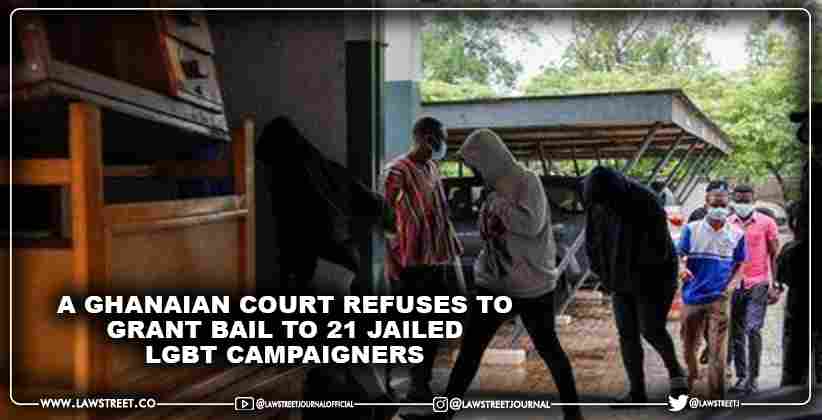On 8th June, 2021, according to their lawyer, a Ghanaian court denied bail to 21 LGBT rights activists who were jailed about three weeks ago for what police called an unlawful meeting. The 16 women and five males were ordered to return to court for their next hearing on 16th June. In the south-eastern city of Ho, some people were spotted crying after the judgement.
In the West African country, LGBTQ persons experience severe discrimination, with gay intercourse punished by up to three years in prison. Although nobody has been prosecuted in Ghana for same-sex relationships over the years, the LGBTQ community has recently claimed an onslaught by authorities.
The activists were detained on 20th May in a hotel, according to a police statement at the time. They were accused of advocating LGBT activities through booklets and leaflets like "Coming Out" and "All About Trans," according to the statement.
The activists had gathered for a course on how to document and report human rights breaches, according to the NGO LGBT+ Rights Ghana. There was no valid cause for the arrests, according to the organisation. In Ghana, it is not illegal to advocate for LGBT rights.
A lawyer for the defendants, Julia Selman Ayetey, told Reuters that they had been denied bail, but did not elaborate. Before bringing their case to the Circuit Court, the activists already had been denied bail at the Ho High Court.
Brief History of Ghana and LGBTQ Community:
Lesbians, gays, bisexuals, and transgender (LGBT) people in Ghana confront legal and societal obstacles that non-LGBT people do not. In Ghana, same-sex sexual actions between males are prohibited, and LGBT rights are severely restricted. The bulk of the Ghanaian people is anti-LGBT. Homophobic violence against LGBT persons is prevalent, and it is regularly supported by the media, religious leaders, and politicians. Government employees, such as police officers, have been known to commit such acts of violence. Allegations of young gay persons being thrown out of their homes are prevalent, as are accounts of conversion therapy being practised throughout Ghana.
Regardless of the fact that the Ghanaian Constitution guarantees citizens the right to freedom of speech, expression, and assembly, LGBT individuals are intentionally denied these fundamental rights. In Ghana, pro-LGBT activity exists, though it is frequently hindered by the Ghanaian government.
Every person in Ghana, regardless of race, place of origin, political opinion, colour, religion, creed, or gender shall have the right to the fundamental human rights and freedoms of the individual contained in this Chapter but subject to respect for the rights and freedoms of others and for the public interest, says Section12(2) of Chapter 5 of the Ghanaian Constitution.






